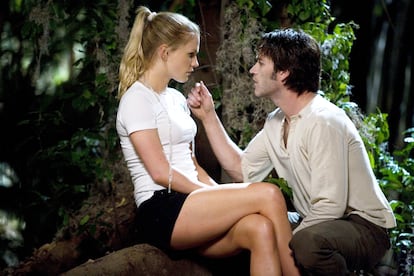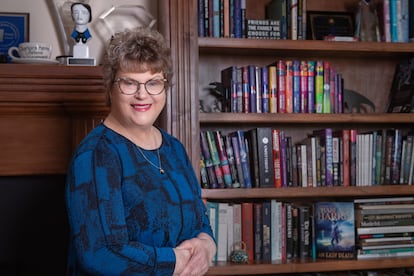Charlaine Harris, the other Queen of the Damned
The author of the vampire series that inspired the cult TV show ‘True Blood’ explains how she wrote the novels to process the trauma of a sexual assault that nearly left her dead

The first thing acclaimed mystery author Charlaine Harris wrote was a ghost poem. She has always believed in ghosts. “I’m a Christian. I know there’s something after this,” she says, smiling. Her permed hair doesn’t budge. Harris (Tunica, Mississippi, 71) has kept her same exact look since the moment she published her first book at the age of 30. At the time, she had been married for three years to her second husband, Hal Schulz. It was Shultz who had encouraged her to follow her idol, Shirley Jackson (“I don’t know how many times I’ve read The Haunting of Hill House. It’s one of my favorite books!”) and stay home and write. Soon, Harris would begin conjuring the searingly supernatural otherworld that would eventually become True Blood, the vampire television series starring telepathic waitress Sookie Stackhouse, based on the books by Harris and adapted for TV by Alan Ball.
Today, Harris is “a lovable little grandma,” as she puts it. “My two grandkids think all grandmas in the world write vampire books,” she says, laughing. It’s a July morning, and Harris is sitting at a table in the lobby of her hotel in Avilés, Spain. Each of the five events she participated in during this week’s Celsius 232 Festival — Spain’s largest Sci-Fi and Fantasy book festival, named after the Celsius equivalent for Fahrenheit 451 — has been packed with attendees. And at each event, she reminisced on her experience of going from run-of-the-mill bestselling author to global fantasy icon when Ball, the creator of Six Feet Under, turned her stories of socially integrated vampires into a major cult classic. “It was really crazy. Suddenly, something that had been left for two years in my agent’s desk drawer had changed my life. I remember the day of the premiere — I had my own red-carpet assistant!” she recalls, still thrilled.

Harris, whose mother was a librarian — and thus the inspiration for Aurora Teagarden, the librarian protagonist of her series about a book club that investigates true crimes — was 57 when True Blood premiered, and the first thing she said to her husband when she saw it was, “We’re going to have to move.” She didn’t think her neighbors in Arkansas, who were at least as Christian as Harris and her husband, would want someone who had written such scandalous stories living next door. So they left. But not then, and not because of their neighbors. They left later, after her fans began harassing them. Like Paul Sheldon, the protagonist of Stephen King’s Misery, the creator of the modern, socially-integrated vampire — the vampire who drinks synthetic blood sold as soft drinks in supermarkets — was crucified by a mob of fans when she published the final title of the series.
“I gave Sookie the ending she deserved. She had changed my life: I had to give her what she always wanted! She didn’t want to be a vampire, she wanted to be able to enjoy the sun and have children, so she wasn’t going to choose Eric the vampire — she was going to choose the werewolf,” she says. For Harris, her fans’ violent reaction to the decision brought back a trauma from her twenties that remains “the wound” that she closes “at the end of each book.” When she was 25, a man broke into her apartment and raped her at knifepoint. After that, she became a weightlifter and began training in karate. She never wanted anything like that to happen to her ever again. “It was like being exposed to the real world for the first time. People think that kind of thing won’t happen to them. But it does happen. There’s the world you live in, then there’s the world you could live in and that you do live in when something like that happens to you. It’s horrible,” she says. That’s why the protagonists of her novels are always women who strike back.
And they are also women who tend to be invisibilized. “It’s true. It’s no accident that all of them [from Aurora Teagarden to Lily Bard, the cleaning woman protagonist in another of Harris’s series] have unskilled jobs that involve, in some way, serving someone,” she says. “I’m interested in making it clear how much these people we pretend not to see know about us.” Sookie Stackhouse is the epitome of this: the waitress who can hear what you think — about her, and about everything. “If I were given a choice of one power, the last thing I’d choose would be to read minds,” Harris says. “I would never want to know what other people were thinking about me at a given moment.” What started out as a disability (“I wanted to give her something she had to overcome”) became, Harris says, something that made her belong to a community: the supernatural community of the weird and ostensibly accepted, but still marginalized.
“It’s funny. Given the tyranny of today’s market, I sometimes say to myself that if I had started writing that series now, it would have never been published. Maybe I wouldn’t even exist as an author!” Harris says. “The Sookie series didn’t take off until the third book, and I had pretty much completed it by the time the adaptation was being filmed. At the time, publishers believed in the author. They gave a margin of three or four books per series for things to take off. Today, if the first book doesn’t succeed, it’s hard for there to be a second one, and there definitely won’t be a third,” she says. “Would I want to write about that universe again? There’s a project out there that plans to revive characters from the series, and I’d be happy to do it, but who knows.” She says she’s not as fit as she used to be, when she could finish a book, or even two, in one year. “I’ve had Covid twice, and my brain isn’t the same,” she says.
Harris, who lives in Texas and is a respected member of her local Episcopalian Church, jokes about the paganism — and fiery sex scenes — in her work, and admits that there was a very clear message behind True Blood’s acceptance of difference. “I’ll never understand why anyone would be upset that you love someone of the same sex. What are they thinking? It’s the most normal thing in the world!” she says. At her book signings, Harris says that someone claiming to be a vampire or a werewolf will show up from time to time: “And I tell them, ‘Great, show me!’ But none of them have ever been able to show me their fangs.” Harris has always been a voracious reader. Even today, she reads three to four books a week (this week, it’s Bill Bryson and David Sedaris) because her sense of humor requires literary nourishment. And because above all else, Harris is someone who loves books, whether she’s reading or writing them. “Really, the reason I’m where I am is because I get bored to death very easily. I write for fun, yes,” she says with a smile.
Sign up for our weekly newsletter to get more English-language news coverage from EL PAÍS USA Edition
Tu suscripción se está usando en otro dispositivo
¿Quieres añadir otro usuario a tu suscripción?
Si continúas leyendo en este dispositivo, no se podrá leer en el otro.
FlechaTu suscripción se está usando en otro dispositivo y solo puedes acceder a EL PAÍS desde un dispositivo a la vez.
Si quieres compartir tu cuenta, cambia tu suscripción a la modalidad Premium, así podrás añadir otro usuario. Cada uno accederá con su propia cuenta de email, lo que os permitirá personalizar vuestra experiencia en EL PAÍS.
¿Tienes una suscripción de empresa? Accede aquí para contratar más cuentas.
En el caso de no saber quién está usando tu cuenta, te recomendamos cambiar tu contraseña aquí.
Si decides continuar compartiendo tu cuenta, este mensaje se mostrará en tu dispositivo y en el de la otra persona que está usando tu cuenta de forma indefinida, afectando a tu experiencia de lectura. Puedes consultar aquí los términos y condiciones de la suscripción digital.









































